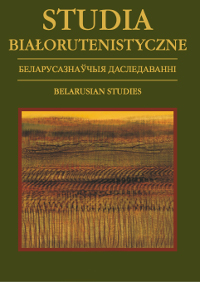Miejsca pamięci, pamięć traumatyczna i nostalgiczna
oraz pamięć językowa w życiu rodzinnym powojennych
przesiedleńców z północnokresowego Nowogródka i okolicy
Memorials, Traumatic and Nostalgic Memory and Language Memory in the Family Life of Post-War
Displaced People from Novogrudok and the Surrounding Area
Author(s): Tadeusz LewaszkiewiczSubject(s): History, Social Sciences, Sociology, Post-War period (1950 - 1989), Migration Studies
Published by: Wydawnictwo Naukowe Uniwersytetu Marii Curie-Sklodowskiej
Keywords: Memory Science; traumatic; nostalgic and linguistic memory; lexical kresovisms; Novogrudok; post-war population displacement
Summary/Abstract: This article refers to the studies from so-called Memory Science, an interdisciplinary scientific field, which has received a lot of attention in the last few decades. The purpose of the article is to present the elements of symbolic types of „memory” (indicated in the title of the article) in the collective memory of post-war displaced people from Novogrudok and the surrounding area. The method of writing and recording of statements and excerpts from correspondence was used to collect the memoirs; the linguistic material was collected on the basis of long-term linguistic observations of displaced people, questionnaires and excerpts from written sources (letters, school notebooks, drafts of applications and various notes). Traumatic memory refers to the painful events of World War I, the period of the Polish-Bolshevik war (1919–1921), recalled in the interwar period, as well as memories from the Second World War (memories of the murdered Jews of Novogrudok). This includes the two post-war years, in which the displaced people had to leave Novogrudok. Nostalgic memory is based on the fact that after 1945 they missed their homeland, Novogrudok and its surroundings, something that was valuable in their life but was lost. The manifestation of linguistic memory is primarily the fact that more than 200 well-known lexical kresovisms, mainly of Belarusian, Belarusian-Russian and Russian origin, have been preserved in the language of displaced people from Novogrudok and the surrounding area, and partly in the language of their children (born no later than 10–15 years after the war).
Journal: Studia Białorutenistyczne
- Issue Year: 1/2021
- Issue No: 15
- Page Range: 55-67
- Page Count: 13
- Language: Polish

